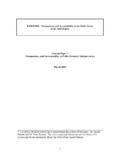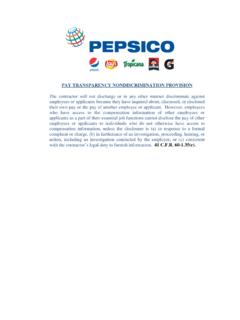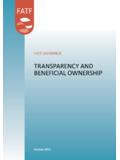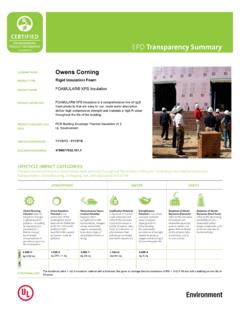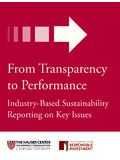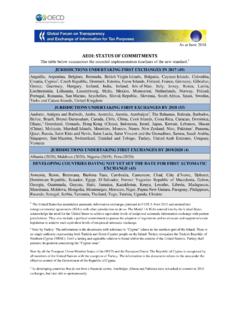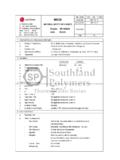Transcription of PROMOTING TRANSPARENCY AND EXCHANGE OF …
1 PROMOTING TRANSPARENCY AND EXCHANGE OF INFORMATION FOR tax purposes A Background Information Brief 19 January 2010 For more information please contact: Jeffrey Owens, OECD Centre for Tax Policy and Administration Director or Pascal Saint-Amans, Global Forum Secretariat PROMOTING TRANSPARENCY AND EXCHANGE OF INFORMATION FOR tax purposes 19 January 2010 2 1. Tax avoidance and tax evasion threaten government revenues throughout the world. The US Senate estimates revenue losses amount to 100 billion dollars a year and in many European countries the sums run into billions of euros. This translates into fewer resources for infrastructure and affects the standard of living for all of us in both developed and developing economies. Globalisation generates opportunities to increase global wealth but also results in increased risks. The increase in cross-border flows that come with a global financial system require more effective tax cooperation.
2 Better TRANSPARENCY and information EXCHANGE for tax purposes are key to ensuring that taxpayers have no safe haven to hide their income and assets and that they pay the right amount of tax in the right place. The OECD is the leading organisation in the area of tax cooperation and has been working on the issues of TRANSPARENCY and EXCHANGE of information for over 15 years. 2. Since the beginning of 2008 international tax evasion and the implementation of high standards of TRANSPARENCY and EXCHANGE of information have been very high on the political agenda, reflecting recent scandals that have affected countries around the world and the spotlight that the global financial crisis has put on financial centres generally. Tax TRANSPARENCY was a key feature of the G20 Summits in Washington, London and Pittsburgh. In London, the G20 leaders stated that: We agree to take action against non-cooperative jurisdictions, including tax havens.
3 We stand ready to deploy sanctions to protect our public finances and financial systems. The era of banking secrecy is over. We note that the OECD has today published a list of countries assessed by the Global Forum against the international standard for EXCHANGE of tax information. 3. In Pittsburgh they underscored the need for quick progress, stating that they stand ready to use countermeasures against jurisdictions that do not adopt the standards developed by the OECD and the Global Forum. (See Annex II for a history of G7/G8/G20 support for this work.) 4. In 2009, more progress toward full effective EXCHANGE of information has been made than in the past decade. In the run up to the G20 summit held in London on 2 April 2009, the standards on TRANSPARENCY and EXCHANGE of information developed by the OECD were endorsed by all key players, including jurisdictions which had so far been opposed to exchanging bank information.
4 As a result, the standard of information EXCHANGE on request, including bank and fiduciary information, is now universally endorsed and the UN has incorporated the OECD standard in the UN Model Tax Convention in October 2008. The OECD Secretary General stated what we are witnessing is nothing short of a revolution. By addressing the challenges posed by the dark side of the tax world, the campaign for global tax TRANSPARENCY is in full flow. We have equipped ourselves with the institutional means to continue the campaign. With the crisis, global public opinion s expectations are high, their tolerance of non-compliance is zero and we must deliver . 5. Not only has the standard been universally endorsed but it is now being implemented as hundreds of information EXCHANGE instruments have been concluded over the past few months. Information EXCHANGE requires that jurisdictions do conclude such international agreements to be in a position to enter administrative assistance in all tax matters.
5 In 2009, more than 300 agreements were signed by jurisdictions which were identified by the OECD as not substantially implementing the standard in the progress report published on 2 April in conjunction of the G20. Since that date, 19 jurisdictions have been removed from that category for having signed at least 12 agreements to the standards. Even though some offshore financial centres (OFCs) have signed agreements with PROMOTING TRANSPARENCY AND EXCHANGE OF INFORMATION FOR tax purposes 19 January 2010 3 other OFCs, the vast majority of agreements are with countries which have an interest in obtaining information for tax purposes . Also, many of the jurisdictions which have reached the threshold of 12 agreements continue negotiating and signing more agreements. 6. Signing agreements is a necessary step towards full implementation of the standard. It is however also necessary that these agreements enter into force and are effectively implement.
6 In order to monitor and trigger effective EXCHANGE , the Global Forum on TRANSPARENCY and EXCHANGE of Information for tax purposes was restructured and strengthened as decided at its Mexico meeting on 1-2 September 2009. The Global Forum now includes 91 members on an equal footing. Membership includes all G20 members, all OECD countries and all offshore jurisdictions. It has a three year mandate to peer review all the members and other jurisdictions which may require special attention. The peer reviews will encompass two phases: Phase 1 will review the legal and regulatory frameworks while phase 2 will assess the practical implementation of the standard. The reports will include recommendations to improve the situation in the reviewed jurisdictions. 7. In fewer than 3 months, the Global Forum Secretariat has been established and is now fully operational.
7 The Steering Group met once and the Peer Review Group twice to develop terms of reference and a methodology to be able to launch the peer reviews early in 2010. The Steering group will meet in New Delhi on 11 and 12 February. A Schedule of reviews will also so be published shortly. 8. In addition, the G20 and the OECD have stressed the importance for developing countries to benefit from the sea change in TRANSPARENCY and EXCHANGE of information. Already some emerging economies have entered into negotiations of tax information EXCHANGE instruments. It is in particular the case of Argentina, China, India, and South Africa. The Global forum membership is open to developing countries. The OECD is also in the process of amending the joint OECD Council of Europe Convention on Administrative Assistance in order to bring it up to the standard and open it up for signatures to non OECD countries.
8 Together with the Development Assistance Committee, the OECD Committee for Fiscal Affairs is developing a technical assistance programme as well as exploring means to ensure developing countries full benefits of the recent changes. Recent progress 9. Progress in 2009 can be summarised as follows: In 2009, the standard has been universally endorsed as the four OECD countries (Austria, Belgium, Luxembourg and Switzerland) which were opposed lifted their reservation to Article 26 of the OECD Model. The three non-cooperative tax havens which refused to endorse the standard finally did so in March (Andorra, Liechtenstein and Monaco). The four Global Forum jurisdictions which had not committed to implement the standard on 2 April did so soon after this date (Costa Rica, Malaysia, Philippines and Uruguay). Finally, all the non-OECD countries which expressed a reservation to Article 26 withdrew their reservation, including Brazil, Chile and Thailand.
9 As the UN also endorsed the new version of Article 26, the standard can now be considered as the internationally agreed standard. The standard is now being implemented by countries which were reluctant to commit to it: in 2009 almost 200 TIEAs were signed and 110 double taxation conventions (DTCs) or protocols have been signed or brought up to the standard by countries which were considered not to have substantially implementing the standard on 2 April. Altogether these jurisdictions have now signed almost 250 TIEAs since 2000 with dozens more under negotiation. PROMOTING TRANSPARENCY AND EXCHANGE OF INFORMATION FOR tax purposes 19 January 2010 4 Austria, Andorra, The Bahamas, Chile, Hong Kong, China Liechtenstein, San Marino, Singapore and Macao, China have passed legislation aimed at implementing their commitments to the international tax standard.
10 Costa Rica, Guatemala, Malaysia, the Philippines and have initiated important legislative changes intended to allow them to meet the international tax standards. Since the issuance of the 2nd April Progress Report 19 jurisdictions Antigua and Barbuda, Aruba, Austria, Belgium, Bermuda, British Virgin Islands, Bahrain, Cayman Islands, Chile, Gibraltar, Liechtenstein, Luxembourg, Monaco, Netherlands Antilles, Samoa, San Marino, Singapore, Switzerland and the Turks and Caicos Islands have moved to the category of jurisdictions having substantially implemented the standard in the Progress Report 10. These policy changes represent a very significant step toward a level playing field as regards EXCHANGE of information for tax purposes . However, these must now be followed up with swift and consistent implementation, which the OECD and the Global Forum will review and closely monitor.










